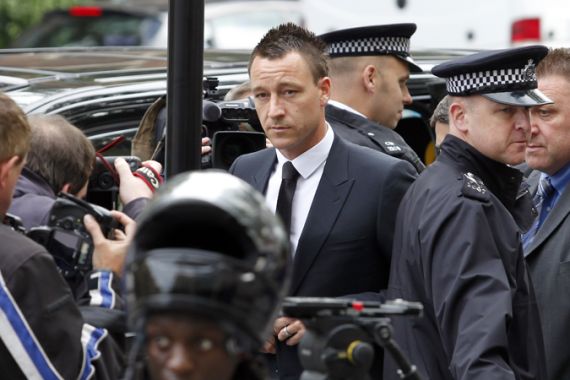Four things we learned this week
From John Terry’s acquittal to the Olympic security woes, we review the sporting week’s talking points.

John Terry acquitted of racism, but distasteful saga not over
So John Terry is not a racist. The former England captain and Chelsea skipper emerged from Westminster Magistrates’ Court acquitted of racism on Friday after a high-profile court case.
Keep reading
list of 4 itemsRecord win against Chelsea moves Arsenal three clear in Premier League
‘Disgrace’: Ten Hag slams criticism over Man United’s FA Cup semifinal win
Inter win heated Milan derby to seal 20th Siere A title
Terry was accused of uttering racist words towards QPR’s Anton Ferdinand in an English Premier League game at Loftus Road on 23 October last year. The 31-year-old defender had never denied saying the words, but claimed he was repeating them back to Ferdinand sarcastically after the QPR defender accused Terry of having made the allegation.
The District Judge found Terry not guilty, but the court case, and revelations about routine abuse between players and the crowd in the world’s most profitable football league, has been a sad and distasteful affair.
The court spent a week listening to the weekly jabs and jibes that take place on pitch in a bad PR exercise for English football that prides itself on its ‘respect’ campaign. For Terry, who was stripped of the England captaincy after the criminal charges were laid, it appears the saga is not over. He is still under investigation from the English Football Association.
This tedious nine-month affair is a warning to footballers that racist language is no longer tolerated, either as a day-to-day insult or a sarcastic exclamation. Last season’s badly-handled incident involving an eight-match ban for Liverpool’s Luis Suarez for using racist language against Patrice Evra was another example of this, and Terry’s court-case has been a much needed eye-opener into the dark side of footballing culture in England.
Didier Drogba: On the money
For John Terry’s former Chelsea team-mate, things were a little brighter this week.
“Really, I didn’t come here with the idea of making a lot of money,” Drogba said after receiving a hero’s welcome at Shanghai airport. “I came here because it is a completely different challenge from what I have seen in Europe before. And that’s the idea, there are many challenges but this one is a big one.”
The Ivory Coast striker tried to convince us that it was all about the challenge as he arrived in China to fulfil his $300,000 a week, two-and-a-half year contract with struggling side Shanghai Shenua.
But Drogba’s actions seem the best way to end a glittering career, so why not follow the money?
Drogba scored 157 goals in 341 appearances for English club Chelsea and was instrumental in helping them win the European Champions League title this year. But as a 34-year-old striker his time was running out at the top of his game.
The mounting speculation and rumours that follow players – particularly strikers – after they hit thirty is a hard thing for players that know football but nothing else. For Drogba the answer was clear, and as he joins former Chelsea team mate Nicolas Anelka in the Chinese Super League we wish him the best of luck.
Olympics: Fortress London
The Olympics are coming, if you hadn’t heard.
With less than two weeks before the Games of the 30th Olympiad, GS4, the private contractor tasked with supplying security officials for the Games has admitted it is unable to supply enough security guards for the event, forcing the British government to put 3,500 extra troops on standby to fill the gap.
The security operation at the London Games is one of the biggest planned in peacetime Britain.
About 23,000 security guards are expected to police venues, providing airport-style checks to search and screen spectators. The additional 3,500 troops would take the armed forces tally at the Games to 17,000, more than the 9,500 currently deployed in Afghanistan.
Restrictions in the airspace over London and much of south-east England began on Saturday with fighter jets on standby and missiles placed on resisdential roofs near the Olympic park site.
Safety is paramount, of course, but it seems a shame that the Olympic ideals of sport transcending politics, and coming together to celebrate through peaceful sporting competition do not seem able to prevail in the modern world.
Saudi athletes: A small leap in the right direction
Saudi Arabia will send female athletes to the Games for the first time after heavy lobbying and long-running negotiations with the IOC. A judoka and an 800m runner will represent the kingdom in London.
The decision means that every single country competing in the Games will be represented by male and female athletes, after Brunei and Qatar – the only other countries to have never included women – confirmed earlier this year that their delegation would include women.
IOC President Jacques Rogge welcomed the decision: “You know, it’s a human right. Women have the right to practice sport, they want to practice, they love sport; they are attracted to sport. And we must make sure that barriers are broken down.”
Human rights group have hailed the decision as a step forward for Saudi women but fundamentally female participation in sports has long been a controversial issue in Saudi Arabia, with public participation in sport still fiercely opposed by many Saudi religious conservatives.
Will two female competitors at the Games change attitudes? Probably not. But it is a step in the right direction. It is just surprising the decision took this long and that the IOC took a ‘softly-softly’ approach. Why not put a condition on the table: Send female athletes or lose your spot, rather than negotiating up until two weeks before the games. This is, after all, 2012.